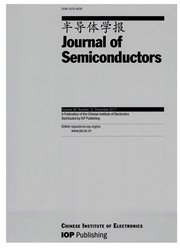

 中文摘要:
中文摘要:
The influence of co-precipitation of copper and nickel on the formation of a denuded zone(DZ) in Czochralski silicon(Cz Si) was systematically investigated by means of etching and optical microscopy(OM).It was found that,for conventional high-low-high annealing(CFA),the DZ could be obtained in all specimens contaminated by copper and nickel co-impurity at different steps of the heat treatment,indicating that no copper precipitates or nickel precipitates were generated in the region just below the surface.However,for rapid thermal annealing(RTA)-low-high annealing,the tendency is not the same; the DZ could not be found in the specimen which was contaminated by copper and nickel contamination before the first RTA annealing.On the basis of the experimental results,it was supposed that the concentration and distribution of the vacancies generating during the RTA can influence the distribution of copper precipitation and nickel precipitation along the cross-section of Cz Si significantly,and thus influence the formation of the DZ to a great extent.
 英文摘要:
英文摘要:
The influence of co-precipitation of copper and nickel on the formation of a denuded zone (DZ) in Czochralski silicon (Cz Si) was systematically investigated by means of etching and optical microscopy (OM). It was found that, for conventional high-low-high annealing (CFA), the DZ could be obtained in all specimens contaminated by copper and nickel co-impurity at different steps of the heat treatment, indicating that no copper precipitates or nickel precipitates were generated in the region just below the surface. However, for rapid thermal annealing (RTA)-low-high annealing, the tendency is not the same; the DZ could not be found in the specimen which was contaminated by copper and nickel contamination before the first RTA annealing. On the basis of the experimental results, it was supposed that the concentration and distribution of the vacancies generating during the RTA can influence the distribution of copper precipitation and nickel precipitation along the cross-section of Cz Si significantly, and thus influence the formation of the DZ to a great extent.
 同期刊论文项目
同期刊论文项目
 同项目期刊论文
同项目期刊论文
 期刊信息
期刊信息
